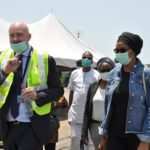As of February 1, 2020, the Nigeria Security Tracker brought the Boko Haram related death toll to approximately 70,000. In 2018, CNN reported that the International Crisis Group had ranked the pastoral conflict between farmers and herders in Northern Nigeria as a six times deadlier threat to the country’s stability than the Boko Haram attacks. These issues have especially tormented the North, with the Northeast accounting for a majority of the extremist and terrorist inflicted casualties, while the Northwest and North-central experience the worst of the pastoral conflicts.
Simultaneously, kidnapping and armed robbery have become so rampant and profitable in Nigeria. In reality, for example in the Northern Region, and particularly North-central and Northwest part of Nigeria with vast kidnapping cases, the Kaduna-Abuja expressway has been a hotspot for kidnappers for more than four years with the continuing absence of armed forces patrol in the region. As if not already tortured by enough terror, the poor deployment of the armed forces in some rural areas in response to these issues has ironically only contributed to the growing death toll. The undisguised abuse of human rights and vast humanitarian catastrophes are clearly linked to a whole set of problems, including the lack of a reliable armed police force, and a situation where the soldiers are crying out that they are being abandoned to their fate by the generals.
Using the military as the people’s first defence against insecurity has only functioned to inject a feeling of hopelessness to the already vulnerable and uncertain population of the North. With all this predominant frustration and hopelessness, harmful Islamic stereotypes and tribal prejudices that colour how these violent events are reported only act to misdirect frustration and require the exertion of control through violence and aggression targeted against whomever.
At the height of this security crisis, Nigeria’s President Muhammadu Buhari rode on the promises of prioritizing life and providing safety to Nigerians. However, over the past five years of the Buhari presidency, the insecurity problems in Nigeria remain inconclusive. In addition to, and as a result of the numerous kinks in the Nigerian socio-political framework, the average Nigerian exists in a reality of vulnerability, and uncertainty with no means to hold their elected officials accountable.
Speculations suggest that a majority of these attacks are malicious political propaganda exploiting the religious and tribal divides in the country. The fact stands that there is an insecurity problem and the government is not doing enough.
One of the major roles of any modern-day government, going by the social contract, is to maintain domestic peace and ensure liberty under the law for all citizens. The erosion of basic policing, basic operational information, intelligence gathering or surveillance in the face of military intervention has continuously proved unsuccessful in addressing the rampant insecurity problem in the country and especially the region, but has only fuelled frustration and made an argument for the increased insurgency.
At the rate of this spiral, if nothing new is done to combat these issues, matters will escalate to a point of no return with confusion and anxiety and a loss of sense of social and personal identity. A complete review of the security structures and personnel should be a top priority. The structures in place should reflect the realities of present-day Nigeria. The policing efforts and techniques need to catch up with the rapidly urbanising country, and the armed forces need to be depoliticised and disciplined to answer to one chief.
For the country to successfully come out of this era in one piece, elected officials need a thorough and tested knowledge of their constitutional duties, limitations and checks and balances. Political power is consequential and the entire governmental machinery needs to operate within the framework of that realization.
Additionally, no one is a stranger to the fact that Nigeria is being abandoned in the international community. Coupled with the embarrassing unemployment and inflation rates in the country, financial freedom to make bare minimum rational steps to protect one’s life and property such as relocation is a very selective privilege. The social welfare of the people is a governmental responsibility that is paramount to safety as policing, and the masses need to be made aware that they are entitled to it under being citizens.
The government needs to take active measures to take guns out of the hands of the youth and replace them with education and gainful employment, not just to restore a sense of dignity, but to elevate the predominant mindset. Awareness and enlightenment from education not only contribute to a degree of options for financial security. Additionally, education and awareness provide a refined lens to analyse situations and reduce the occurrence of conclusions based on religious and tribal stereotypes and prejudices. It is fair to say, an educated population with an understanding of the system and the functionalism within which it operates will be more likely to focus their frustrations on the actual issues in the system. Regardless of how we came to be, we are all Nigeria, and we all share a collective responsibility in our outcome.
Khalid Ahmed Mohammed sent this from Kaduna via amg1712@yahoo.com
YOU SHOULD NOT MISS THESE HEADLINES FROM NIGERIAN TRIBUNE
Buy and read digital replicas of your TRIBUNE titles by subscribing through E-VENDING
Make No Mistake, Coronavirus Will Be With Us For A Long Time, Says WHO DG
The head of the World Health Organisation (WHO), Tedros Adhanom Ghebreyesus, said on Wednesday that he hoped the Trump administration would reconsider its suspension of funding, but that his main focus was on ending the pandemic and saving lives, Reuters reported… Read full story
COVID-19: Governors Adopt Two-Week Inter-State Lockdown • Call for decentralisation of COVID-19 response
The 36 state governors, on Wednesday, unanimously resolved to adopt a two-week inter-state lockdown as part of measures aimed at containing the spread of coronavirus across the country… Read full story
Covid-19: Chinese Treatment Of Africans
IN the wake of the deadly Covid-19 pandemic experience, China has treated African residents within its borders like scum. The situation has been so bad that it is actually difficult to believe that its previous investments in the continent had wholesome intentions. China’s inhuman and hostile disposition to Africans in China… Read full story
FG Bans Inter-State Movement Of COVID-19 Patients
The Federal Government has banned inter-state movement of Coronavirus (COVID-19) patients in the country. Dr Osagie Ehanire, Minister of Health, said this on Wednesday in Abuja, at the Presidential Taskforce (PTF), briefing on COVID-19… Read full story
COVID-19: Fake News Purveyors To Be Sanctioned, Says Lai Mohammed
The Minister of Information, Culture and Tourism, Alhaji Lai Mohammed has said that purveyors of fake news would be apprehended and sanctioned. Mohammed said while fielding questions from newsmen at the Presidential Taskforce on COVID-19 daily press briefing on Wednesday in Abuja… Read full story
ASUU Kicks Against Submission Of BVN As Condition For Payment Of Withheld Two-Month Salaries
The Academic Staff Union of Universities (ASUU) says it has rejected the submission of Bank Verification Number (BVN) as a condition for payment of February and March withheld salaries of lectures… Read full story
FG Replies ASUU: No BVN, No Payment Of Withheld Salaries
The Federal Government on Wednesday insisted that members of the Academic Union of Universities (ASUU) will have to make their Banks Verification Number (BVN) available for the various vice-chancellors to validate before they would be paid their withheld February and March salaries… Read full story
World Bank Predicts Decline In Remittances To Nigeria, Other LIMCs
The World Bank has said that as a consequence of the ravaging COVID-19 pandemic, remittances to Nigeria and other low and middle-income countries (LMICs) are projected to fall by 19.7 per cent to $445 billion… Read full story
High Number Of Coronavirus Cases Evidence Of Community Spread, Says Presidential Task Force
The Presidential Task Force on the novel Coronavirus (COVID-19) pandemic has given reasons the number of infections in the country has shot up… Read full story
COVID-19: Kano Relaxes Lockdown For One Day
Kano State government has relaxed the ongoing lockdown in the state for one day, 6 am-12 pm tomorrow (Thursday). This is to allow residents to buy foodstuffs and other items for preparation of the forthcoming… Read full story
COVID-19: No Definite Time For Evacuation Of Nigerians In US, UK, China, Others, Says Foreign Affairs Minister
Nigerians resident in foreign countries but anxious to return home may have to wait for a longer time. Foreign Affairs Minister, Geoffrey Onyeama, made the disclosure on Wednesday at the daily briefing of the Presidential Task Force to combat the coronavirus pandemic… Read full story
COVID-19, Malaria Double Danger This Rainy Season
The current COVID-19 pandemic has taken the spotlight in the news. Despite the seriousness of the situation, the rainy season is here and so is malaria. In 2018, malaria killed 405,000 people, most of them in Africa… Read full story
WATCH TOP VIDEOS FROM NIGERIAN TRIBUNE TV
- Let’s Talk About SELF-AWARENESS
- Is Your Confidence Mistaken for Pride? Let’s talk about it
- Is Etiquette About Perfection…Or Just Not Being Rude?
- Top Psychologist Reveal 3 Signs You’re Struggling With Imposter Syndrome
- Do You Pick Up Work-Related Calls at Midnight or Never? Let’s Talk About Boundaries







